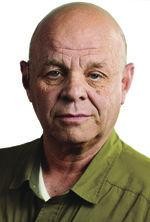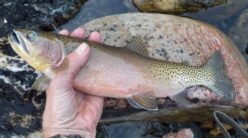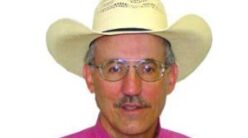Shortly after I was born, I became sick with pneumonia. I recovered from the pneumonia, but it stripped me of most of my hearing and made many of the adults in my extended family out of sorts with me because they thought I was just ignoring them until they got used to the fact that, to get my attention, they often had to actually make physical contact with me.
After a few years, I had adjusted well enough to respond to people even though I wasn't sure how I knew someone was speaking to me and wanted my attention.
My parents could never get me to wear a hearing aid because I didn't want to have the aid in my pocket with a cord going up my chest and into my ear. I also couldn't stand all the static that went on constantly in order to pick up voices and other sounds I might want to know about.
As it turned out, I had decided that most of what people had to say didn't interest me anyway. However, my teachers at school thought that what they had to say was important, so they usually had me sit on the front row and make eye contact with them just as if I was listening to every word.
Once I started hunting, I ran into another problem. I was unaware of how much noise I made walking around the backcountry until my father mentioned to me one day that I would see a lot more game if I could learn to walk more quietly. Because I couldn't hear the noise I was making, it took me a couple of years to learn to be quiet while I hunted.
So in my case, the problem was something I learned to deal with successfully, but there are those who would love to hunt, but who are more severely handicapped than a guy who is hard of hearing, but isn't usually interested in what others have to say anyway.
There are many reasons a hunter might be too handicapped to walk very far or can't walk at all. My perception is that after many who had grown up hunting and had fought during war time came home wounded and disabled efforts were made in many areas to get them back into the field hunting.
Several years ago, I wrote a column, "He is just too crippled to shoot a rifle," about teaching a young boy at Scout camp to shoot a rifle and seeing him earn his Rifle Merit Badge. That experience taught me that the disabled can accomplish more than many of us think they can. All most of them need is a little support and encouragement from the rest of us.
Fortunately, there are several organizations that specialize in giving the disabled a chance to enjoy the hunting experience by taking them hunting and compensating for their handicaps. I thought it might be a good idea to name some of the prominent organizations in our general area, that try to cater to the disabled hunter. The following is certainly not an exhaustive list of those that provide hunting opportunities for disabled hunters, but are some of the better known folks who have been serving disabled hunters for the past few years.
1. Chairbound Hunters is a is a small organization based in Wheatland, Wyoming. They take out a select number of hunters in wheelchairs every year. The hunts are primarily for pronghorn antelope and mule deer.
2. Wyoming Disabled Hunters was started in 2008 with the goal of providing an affordable hunt for disabled sportsmen. They host 10 disabled hunters every year from late October to early November for deer out of ground blinds with archery equipment. In 2012, they added a small number of elk hunters for some bull and cow elk hunts.
3. HelluvaHunt is an annual hunt in Douglas, Wyoming, that has been offered for 25 years. This is a large group hunt that was co-founded by Jim Zumbo and is routinely video taped for his outdoor TV program. Hunters can stay in a dormitory at no charge or at a motel in Douglas. HelluvaHunt takes place once a year in late September or early October. Each hunter has two volunteer guides to help them in the field. This is a rifle hunt and 15 disabled hunters are chosen each year.
4. In Idaho, a rule approved by Idaho's recent legislative session exempts the companion of a disabled hunter from the requirement of having a tag while helping a disabled hunter who has the appropriate tag and a valid disabled combination license. The companion must have a valid license and applicable special weapon permit when assisting a disabled hunter with taking big game. The companion may take wildlife that has been wounded by the disabled hunter and place and validate the disabled hunter's tag on the game taken.
The companion to a disabled hunter must carry a written statement of designation from the disabled hunter while hunting with the disabled hunter or assisting them with taking and tagging their wildlife. For more information about the rules for a companion to a disabled hunter, contact the local Fish and Game office.
I'm not aware of any efforts in Idaho to develop organizations that assist disabled hunters, but if I have missed any, I would appreciate it if someone would email me a note about the organization and where they are located.
Smokey Merkley was raised in Idaho and has been hunting since he was 10 years old. He can be contacted at mokeydo41245@gmail.com.



